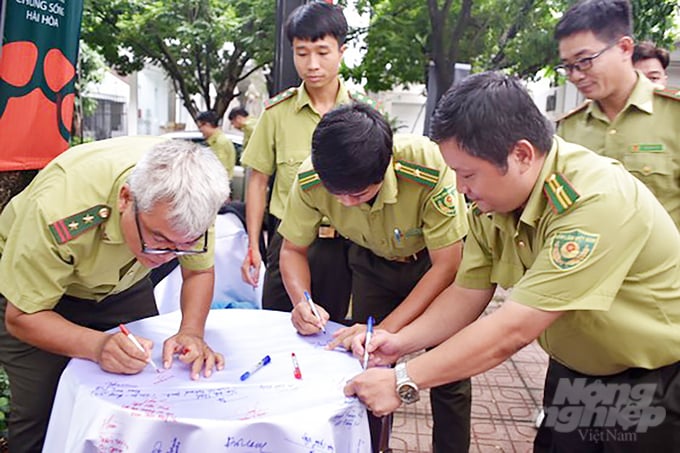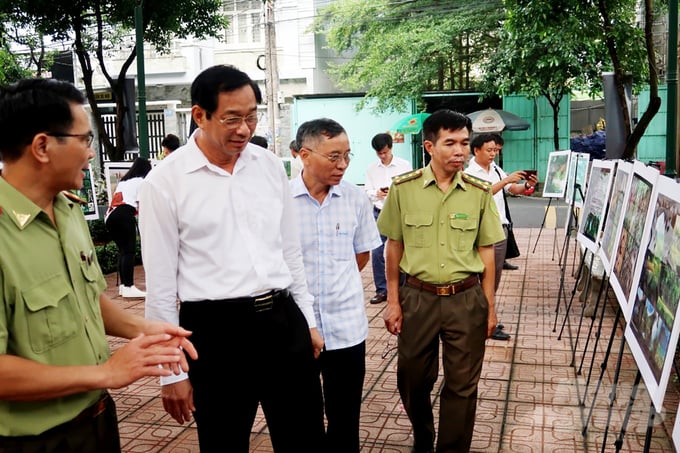June 19, 2025 | 17:32 GMT +7
June 19, 2025 | 17:32 GMT +7
Hotline: 0913.378.918
June 19, 2025 | 17:32 GMT +7
Hotline: 0913.378.918
That is also the assertion of international experts at the Workshop to evaluate the Pilot Program for Elephant Conservation in the direction of harmonious coexistence, organized by VNFOREST in coordination with Dong Nai Provincial People's Committee and the animal assistance organization Human Society International (HIS) was recently held in Bien Hoa City.
Dong Nai has the second-largest elephant population in the country, after Dak Lak, according to the report. However, Vietnam's untamed elephant population has decreased from 2,000 to 130 over the past four decades. Therefore, over the past two years, HIS has implemented a program to monitor elephants using camera traps in order to compile a database of elephant identification information. Each elephant has its own identification certificate that includes its Vietnamese name, age, gender, separating identifier, physical features, and the group or herd to which it belongs.

Images of elephants were recorded from camera traps conducted by HSI. Photo: HSI.
Photos collected from photo capture booths in Cat Tien National Park, Dong Nai Natural and Nature Reserve, and La Nga Forestry Company of the districts of Tan Phu, Vinh Cuu, and Dinh Quan are used to monitor and identify Nga Lech, Cat Tien, and Dat Do elephants. The number of elephants in Dong Nai has been estimated to be between 25 and 27 instead of 14 in the previous report. Ms. Tran Thi Hoa, the National Coordinator of the Conservation Program, also disclosed that, according to research, elephants are now larger than ever before, and their ability to recover in the wild is evident as juvenile elephants are frequently observed. Electric fences have reduced conflicts between humans and elephants, although some elephants still breach the fences. Human efforts to persuade elephants to cross fences make them more aggressive than in the past.
According to the Department of Agriculture and Rural Development in Dong Nai, as one of the Southeast provinces that concentrates a number of industrial clusters and areas in Vietnam, Dong Nai continues to place a high priority on protecting and developing forests and conserving nature in order to ensure the region's sustainable development. Additionally, the province takes proactive measures in implementing and echoing the direction of developing the economy in harmony with nature, avoiding the substitution of the environment for economic development.

Dong Nai province's forest rangers signed a commitment to protect elephants: Photo: MV.
Mr. Le Van Goi, Deputy Director of the Dong Nai Department of Agriculture and Rural Development, stated, "In the work of forest conservation and preservation in general, and elephant conservation in particular, Dong Nai requires a substantial amount of outside resources to be mobilized. notably from international Non-Governmental Organizations. We are prepared to coordinate and collaborate with them to implement these initiatives in the province of Dong Nai. In recent years, Dong Nai has effectively implemented new elephant conservation initiatives that have attracted the attention of other provinces.
The animal welfare organization Human Society International hopes that the results of the pilot program on elephant conservation towards a positive harmonious coexistence in the province of Dong Nai will serve as a positive indicator that the number of elephants in the country is greater than previously thought. The initiative will be expanded further in the provinces, particularly in Dak Lak, Nghe An, Ha Tinh, and Quang Nam, where there are significant elephant populations.

The delegation of Dong Nai province and functional agencies visited the photo exhibition about elephants. Photo: MV.
Director of the Forestry Department Tran Quang Bao stated that beating elephants with sticks, clanging pots and pans, igniting firecrackers and improvised explosives, and ingesting poison are harmful and make elephants more aggressive around humans.
"Over the years, data have been accumulated on the location of conflict, the extent and frequency of conflict, the number of elephants, and their response to conflict mitigation measures. Tran Quang Bao stated that the photo trap initiative to monitor human-elephant conflict will improve conservation strategies by obtaining a greater understanding of elephant habitats.
The pilot program that yielded accurate results on elephants using photo traps has bolstered confidence in the conservation of elephants. The collected data will serve as the foundation for future conservation and herd expansion efforts in Dong Nai; concurrently, it can be replicated in provinces where elephants are distributed locally to reduce human-elephant conflicts and promote a harmonious coexistence throughout the country.

Vice Chairman of Dong Nai Provincial People's Committee Vo Van Phi (right) visits the photo exhibition "Kindness to elephants and nature". Photo: MV.
Vice Chairman of Dong Nai Provincial People's Committee Vo Van Phi told Vietnam Agriculture News that the province is concerned about the ability of the elephant population to be homozygous, that elephants are difficult to recover naturally, that recent investigation results indicate elephant populations have decreased sharply, and that the number of elephant-human conflicts is increasing. Dong Nai therefore aims to be the first province to implement new initiatives to protect endangered species.
"We enthusiastically support the Elephant Conservation Pilot Program for Harmonious Coexistence, which is supported by HIS and international experts. Mr. Phi emphasized that field surveys identified the habitat, activity of elephant populations, elephant conflict data, and people in a standardized format, which was then transferred to software to digitize, analyze, and provide necessary insights regarding conflicts in the province.
"Vietnam's elephant population is presently threatened with extinction, so the Vietnamese Government has made elephant conservation a top priority through the national elephant conservation initiative that HSI is helping to establish, including in Dong Nai. Ms. Tham Hong Phuong, National Director of HIS, shared that with the new research data from HSI, it is feasible to approach conflict situations based on the characteristics, behavior, range, and habits of elephants so that elephants and humans can exist in harmony.
Mr. Nguyen Quoc Tri, Deputy Minister of Agriculture and Rural Development, stated, "Unlike other interventions, this HSI-specific initiative provides us with practical and scientifically-based solutions. From a State management perspective, I value the participation of the project's numerous stakeholders, including the local community, researchers, and animal welfare experts. In light of this, recommendations pertaining to elephants have taken into account the perspectives of both humans and wild animals.
Translated by Linh Linh

(VAN) The waste of resources from agricultural by-products and the situation of counterfeit and poor quality goods in production causing losses of thousands of billions were pointed out by the National Assembly deputy.

(VAN) After 5 years of implementation, the CAI initiative has helped coffee growers change their farming practices, moving toward responsible agriculture that meets global export standards.

(VAN) The primary prerequisite for the comprehensive and robust integration of Vietnam's livestock sector into the global value chain is the establishment of a disease control system.

(VAN) The results of national programs are essential for establishing a contemporary livestock sector that is well-equipped to meet the demands of both domestic and international markets, with robust biosafety standards.

(VAN) The UNESCO Global Geopark revalidation of Non nuoc Cao Bang and the transition to a two-tier administrative model are presently undergoing a pivotal moment in Cao Bang, the northernmost province of Vietnam.
/2025/06/13/5330-2-004539_953.jpg)
(VAN) Changing policy mindset and removing investment barriers are urgent requirements to open up new development space for enterprises in the agricultural sector.

(VAN) The areas include the restoration of five million hectares of marine ecosystems.